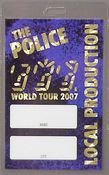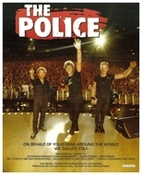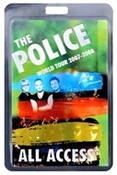
Police Reunion
All good things come in threes...
Screaming fans in front of the band bus, young women shouting declarations of love. These are Beatles-like scenes that The Police experienced after their debut album 'Outlandos d' Amour' (1978) until the trio's breakup in the mid-80s. Drummer Stewart Copeland captured them in his documentary film 'Everyone Stares.' Impressions of Germany are also included. Copeland at the time: 'You can tour Germany on TV. Without trucks, without equipment, without anything. In these pop shows, you sing to playback and look stupid.'
Now, a good year after the start of their reunion tour, The Police are back in Germany. To say goodbye to their fans. Live. And for the first time, they are in East Germany, in Leipzig. The first time is also the last. A historic moment. However, there are no young women screaming declarations of love to be seen in Exhibition Hall 1. Most of the fans are between 40 and 50. Some have brought their children, some their friends – a kind of family celebration.
It begins after the amiable performance of the pop-folk trio Scouting For Girls with a storming 'Message In A Bottle'. The meditative 'Bring On The Night', with which Police opened concerts in America, has been omitted. As if the band had to get straight to the point in Europe. But it takes a few songs before the stage and the audience become one. Perhaps it's the terrible reverb, which turns the sound into sauce, especially in the high stands. By the time the boisterous "Every Little Thing She Does Is Magic" has begun, the police have the crowd under control.
The former new wave boy Sting has become a bearded yoga sage with kind features. Copeland wears glasses on his nose, his hair is snow-white. And when Andy Summers looks at his guitar, his neck arches into a double chin. But what are appearances? For this band, which manages without smokescreens, backup mice, or additional musicians, relying solely on the power of three instruments and a congenial voice, a bit of lighting and a screen, it's not about the highlights, but about the songs. And they have a few that have stood the test of time: 'Walking On The Moon', 'Don't Stand So Close To Me', 'De Doo Doo Doo'... The cool minimalism of the harmonies, the Caribbean lightness of the rhythm, the British knack for pop anthems: no one has mastered the fusion of these three things as perfectly as The Police. To this day.
(c) Leipziger Volkszeitung
A powerful hit parade at the police station – a revival show with a facelift and new drum rhythms – the band delighted their fans...
The see-through negligee must have been left behind during the filming of "Dune" in the mid-80s. At that time, Gordon Sumner, known to everyone as Sting, was already on his way to new shores, away from the three-man island of The Police, with whom he had written a handful of hits and a chapter of rock history in just five years.
But the shirt still fits like a glove a quarter of a century later. Sting, 57, sports impressive steel muscles and a picturesque three-day beard for the comeback of the joint combo with guitarist Andy Summers and drummer Steward Copeland. Without a word, the trio leans on their feet in front of a nearly sold-out crowd for "Message in the Bottle," a global hit almost three decades ago, revamped for a revival show with new drum rhythms.
Exhibition Hall 1, a building with the charm of a large tank depot, is in a frenzy. The three men on the black-lined stage are as small as fingertips, but Sting's still almost flawless falsetto effortlessly reaches all the way to the back, where the older fans are seated in the stands, witnessing the return of the new wave heroes. If you don't do much for a long time, you can't go wrong. The Police released five ground-breaking albums between 1979 and 1983, which briefly made them the most important rock band of all time. Then their musical resources were exhausted, and the performers grew bored with each other. Sting turned to more complex musical structures and deeper messages.
There hasn't been any new music from the police station since then. This spares the three of them the obligatory excursions into tedious new material and treats the audience to an evening full of hits. The program is strikingly similar to that of the last tour before the policemen's departure. From 'Walking On The Moon' it goes to 'Can't Stand Losing You', from 'Every Little Thing' to 'Don't Stand So Close To Me'. Evergreens that everyone knows.
The differences lie in the details. While Police music originally consisted of a virtually patented combination of straight reggae rhythms, a sharp-edged guitar, and Sting's siren song, the three Brits today enjoy mixing in what would once have been frowned upon. A guitar solo here, a glockenspiel interlude there. The ten thousand people in the hall aren't bothered by this as long as the chorus remains recognizable. And that's a promise. Difficult material like 'Invisible Sun' is polished more sleekly with meaningful images of children on screen, while obscure interludes like the whining 'Voices Inside My Head' are only hinted at. Sting is the centre of the show. The crowd yodels along to what he sings.
When Andy Summers, the band's senior at 66, fires reggae riffs from his already somewhat stiff hips, the crowd cheers. The Police return for the encore with a sprawling seven-minute version of the red-light ballad "Roxanne," followed by "King of Pain" and "Every Breath You Take." Then the lights come up and the audience sings "eww, eww, eww, eww!" until Sting finally straps on the bass.
"I'm proud we got back together," says Sting, "but I'm also proud we're ending it now." Last night, the band played their last home concert in London's Hyde Park, followed by three more shows in Spain, and that was it. Forever. "An era is ending," Sting had announced beforehand. But from the stage, he then shouts, "Goodbye, Leipzig!"
(c) Mitteldeutsche Zeitung by Steffen Könau
June 28, 2008
SET LIST
- Message In A Bottle
- Walking On The Moon
- Demolition Man
- Voices Inside My Head
- When The World Is Running Down You Make The Best Of What's Still Around
- Don't Stand So Close To Me
- Driven To Tears
- Hole In My Life
- Every Little Thing She Does Is Magic
- Wrapped Around Your Finger
- De Do Do Do, De Da Da Da
- Invisible Sun
- Can't Stand Losing You
- Roxanne
- King Of Pain
- So Lonely
- Every Breath You Take
- Next To You






